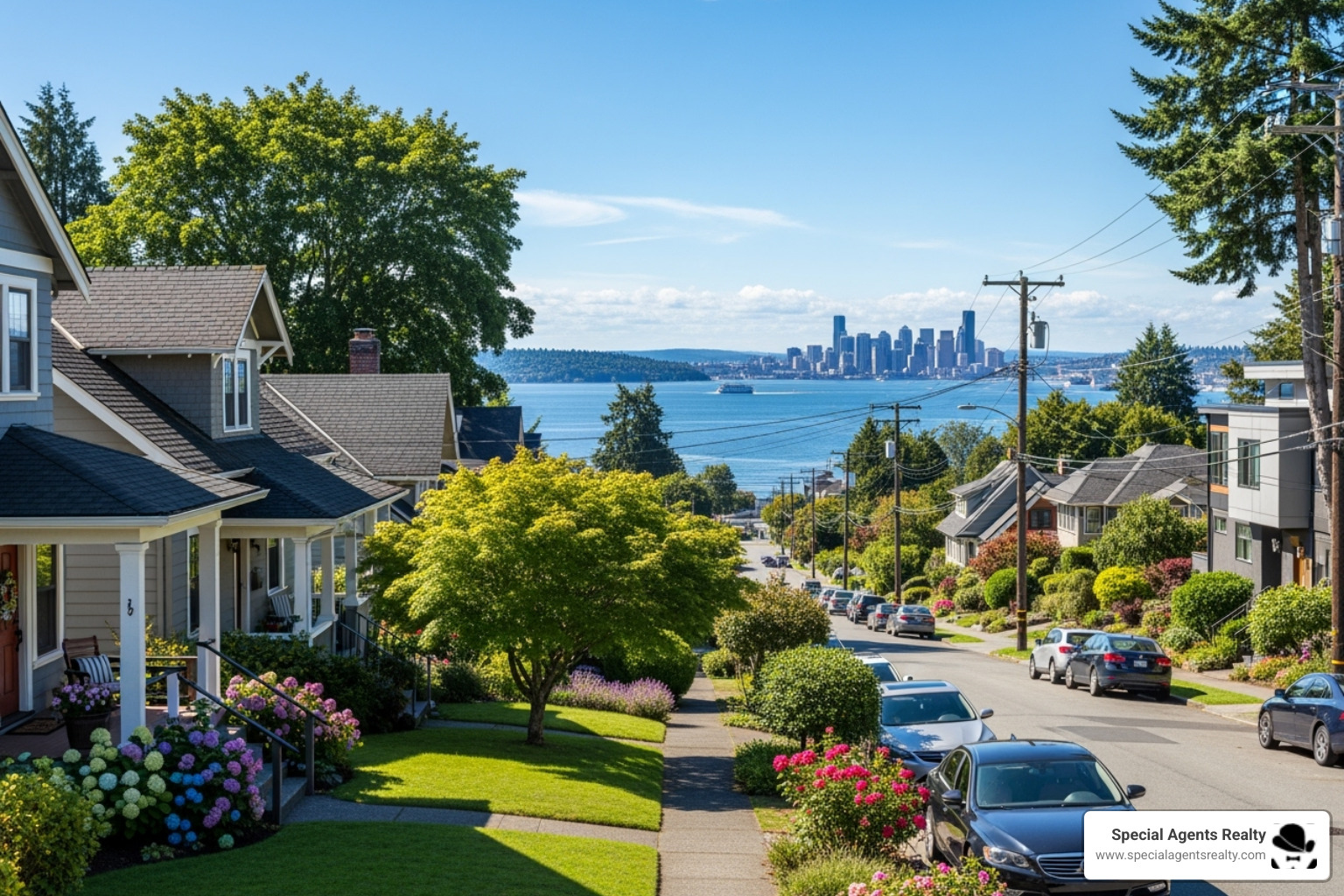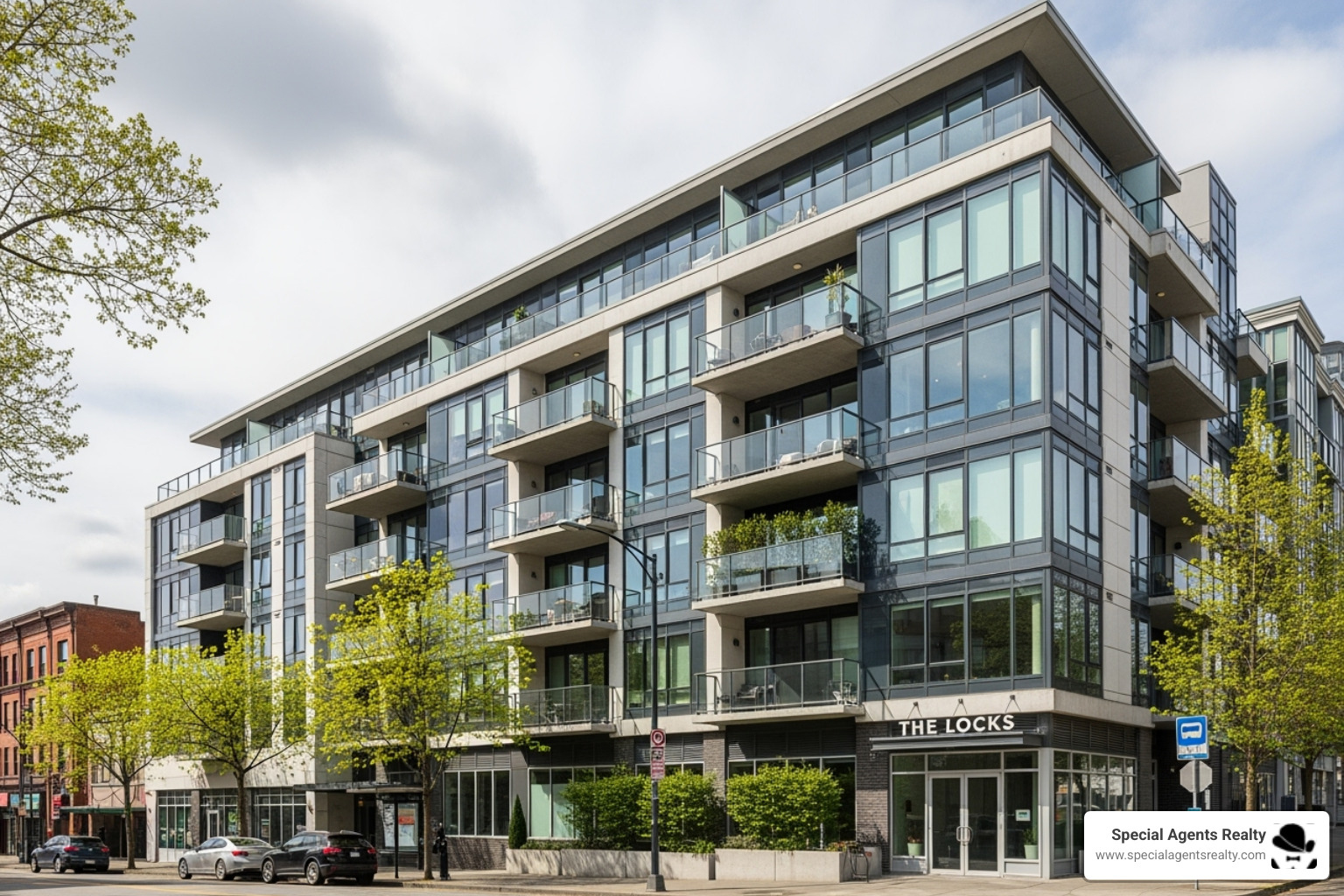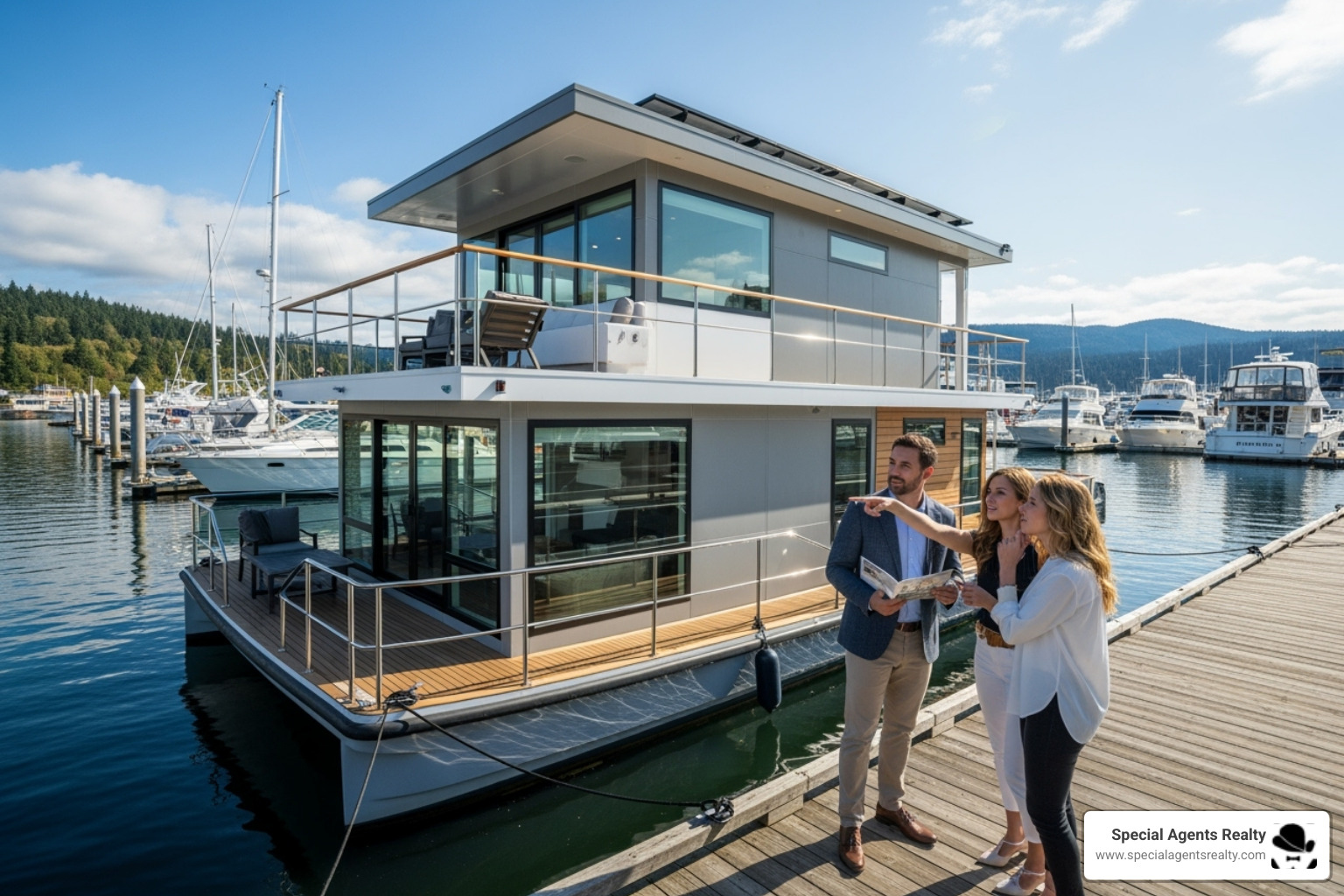
Why Buying a Houseboat Tips Matter for Your Investment
Buying a houseboat tips can save you thousands of dollars and years of regret. As housing prices rise, more people are considering life on the water. Used houseboats can start around $60,000, while floating homes exceed a million. The average annual cost of living aboard is just $6,000.
Essential Buying a Houseboat Tips:
- Understand what you're buying - Houseboats are personal property (like RVs), not real estate
- Get a marine survey - Professional inspection of hull, engines, and systems
- Budget for ongoing costs - Mooring fees ($350-$1,000/month), maintenance, insurance
- Secure proper financing - Traditional mortgages don't apply; expect RV-style loans
- Know the difference - Houseboats are mobile vessels; floating homes are permanent structures
- Check local regulations - Marina rules, permits, and liveaboard restrictions vary widely
- Inspect thoroughly - Hull integrity, engine condition, last haul-out date, and maintenance records
- Ask about the slip - Ownership vs. rental, waiting lists, and transfer rules
- Plan for depreciation - Unlike houses, houseboats lose value over time
- Consider lifestyle fit - Smaller spaces, weather exposure, and pet needs
However, first-time buyers often don't realize that houseboats depreciate like vehicles, require special financing, and finding a slip can be harder than finding the boat. With proper research, houseboat ownership offers an affordable path to waterfront living in communities like Seattle's Lake Union and Sausalito. This guide walks you through every step, from deciding if the lifestyle fits to closing the deal.
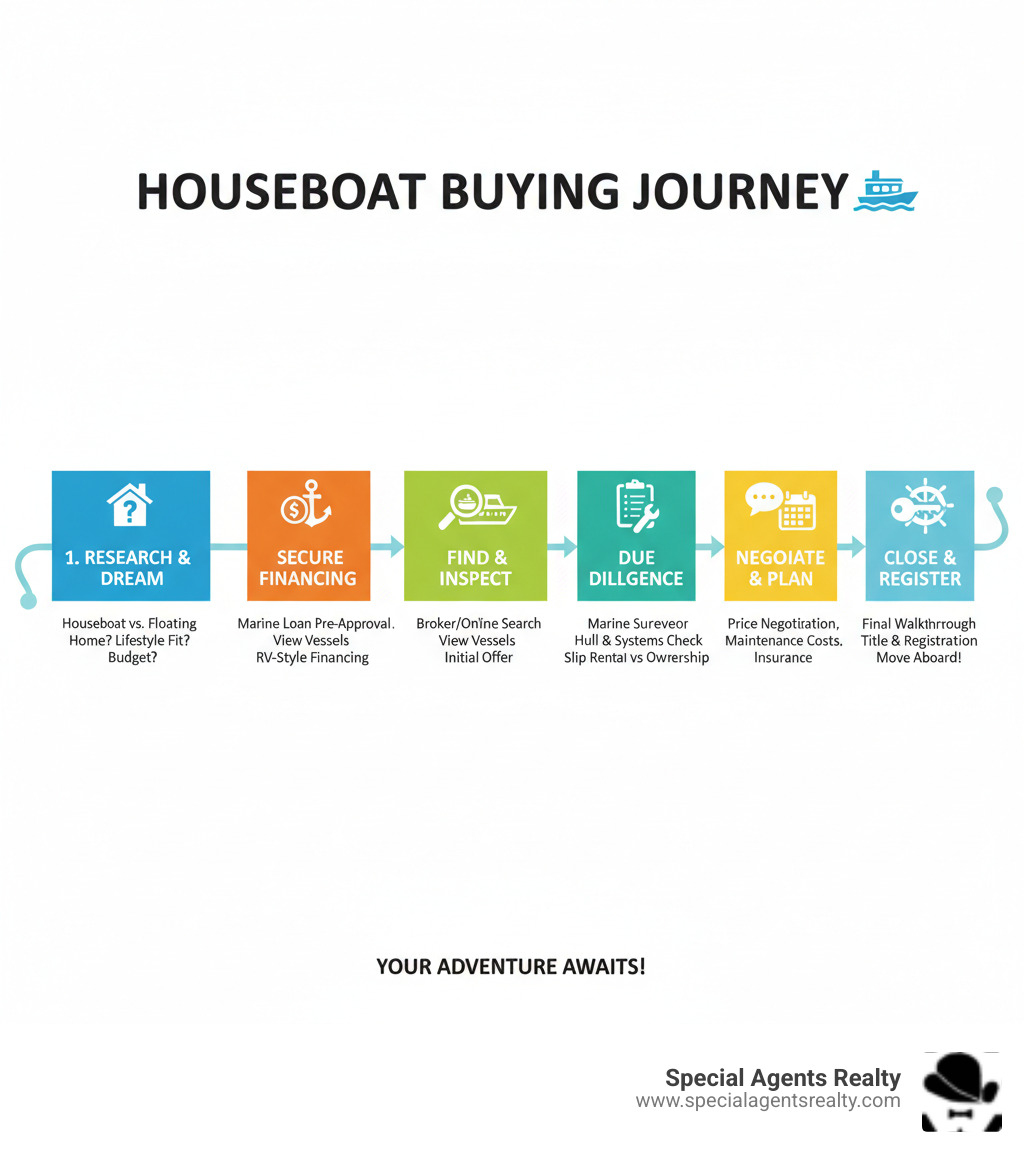
First, Float the Idea: Is Houseboat Life Right for You?

Before searching for a waterfront home, consider if life on the water is truly for you. While the views are magical, houseboat living comes with unique challenges like smaller spaces, weather exposure, and the constant motion of the water. You'll also need to consider practicalities like pet needs and winterization in colder climates.
However, houseboat communities are famously welcoming. Neighbors often become like family, sharing docks and watching out for each other. If a tight-knit community and a simpler life appeal to you, living on the water might be a perfect fit. For a deeper look at daily life, check out this guide to houseboat living.
Houseboat vs. Floating Home: What's the Difference?
Understanding the distinction between a "houseboat" and a "floating home" is one of the most critical buying a houseboat tips. This difference impacts financing, legal rights, and more.
- Houseboat: A vessel designed for navigation, even if it rarely moves. Think of it as a floating RV with engines and easily disconnected utilities. They are legally considered personal property, like a vehicle. In Seattle, they are often called Floating On Water Residences (FOWRs).
- Floating Home: A house built on a permanent floating platform, not intended to move. They are more like waterfront condos with permanent utility connections and are sometimes classified as real property, especially if you own the slip.
The cost reflects this difference. A used houseboat might average $50,000-$60,000, while floating homes often start at $300,000 and can exceed a million dollars.
The Pros and Cons of Living on the Water
Houseboat living has incredible advantages, but it's not without challenges.
Pros:
- Cost Advantage: The average annual cost of living on a houseboat is around $6,000, a fraction of traditional housing. You also don't pay property taxes on the vessel itself.
- Unbeatable Views: Enjoy waterfront scenery that changes with the seasons and weather.
- Special Community: Houseboat neighborhoods are known for their warmth and camaraderie.
- Mobility: A true houseboat offers the freedom to move to different marinas or locations (rules permitting).
Cons:
- Depreciation: Unlike real estate, houseboats lose value over time like vehicles.
- Limited Space: Most houseboats are under 1,000 square feet, requiring a minimalist lifestyle.
- Weather Exposure: You'll feel every storm and temperature swing. Winterization is essential in cold climates.
- Specialized Maintenance: You'll trade lawn mowing for hull cleaning, marine system upkeep, and periodic haul-outs for inspections.
- Financing and Utilities: Loans are more like RV financing (shorter terms, higher rates), and you'll manage freshwater tanks and sewage pump-outs.
The bottom line is you're trading space and appreciation for an affordable, unique lifestyle with incredible views and a strong sense of community. Ensure you understand both sides before taking the plunge.
Navigating the Financial Waters: Costs, Financing, and Taxes
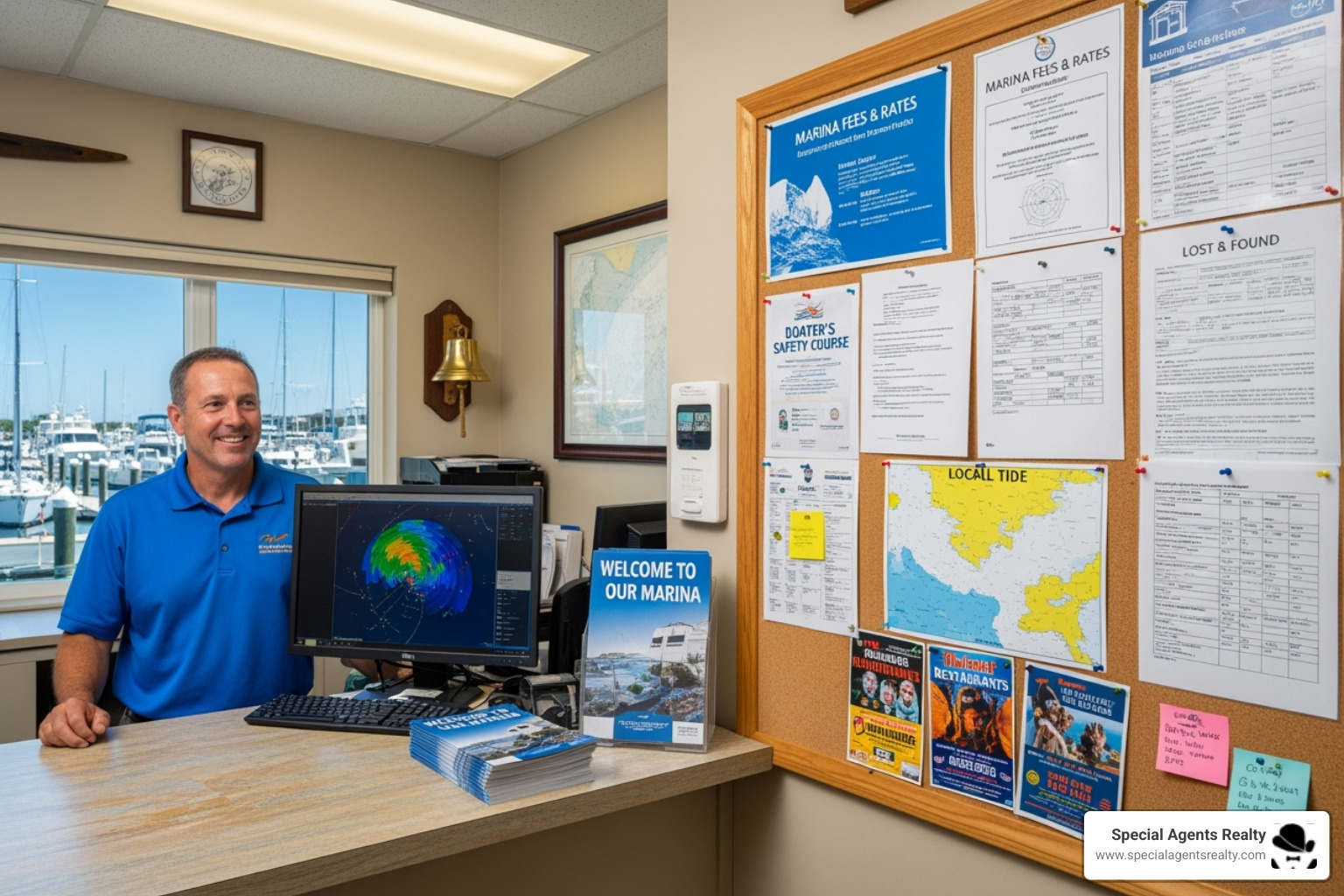
Understanding the financial picture is an essential part of our buying a houseboat tips. The purchase price is just the beginning; you must also account for ongoing costs, unique financing, and different tax rules.
How to Finance a Houseboat
You can't get a standard mortgage for a houseboat because it's considered personal property, not real estate. Lenders treat them like RVs or yachts.
Your best option is a personal property loan from local banks and credit unions with marine lending departments or specialized marine lenders. Expect shorter loan terms (10-20 years), slightly higher interest rates than conventional mortgages, and a down payment of 10-20%. We recommend getting pre-approved early to know your budget and strengthen your negotiating position.
Understanding Taxes and Hidden Fees
This is where houseboat ownership differs significantly from traditional homes.
- Taxes: You generally don't pay property taxes on the houseboat itself. However, you will pay sales tax at purchase and may owe property tax on your slip if you own it (which is rare). For more details, Expert insight on houseboat taxes can clarify your situation.
- Mooring Fees: This is your monthly slip rent, typically ranging from $350 to $1,000. The fee depends on the marina's location, boat size, and included amenities. Some marinas also charge an additional liveaboard fee.
- Maintenance: Budget for regular upkeep, including engine servicing, hull cleaning, painting, and system repairs.
- Insurance: Comprehensive insurance is required to cover accidents, theft, and liability. Costs vary based on the boat's value, age, and location.
- Utilities: While some utilities may be bundled in mooring fees, you'll likely pay for electricity, internet, and propane separately. Don't forget costs for regular sewage pump-outs.
- Depreciation: Houseboats lose value over time, like vehicles. Good maintenance can slow this, but it's a fundamental difference from land-based real estate. You're investing in a lifestyle, not a capital gain.
Despite these costs, the average annual cost of living on a houseboat can be around $6,000, making it an attractive option for many.
The Ultimate "Buying a Houseboat Tips": Inspection and Due Diligence
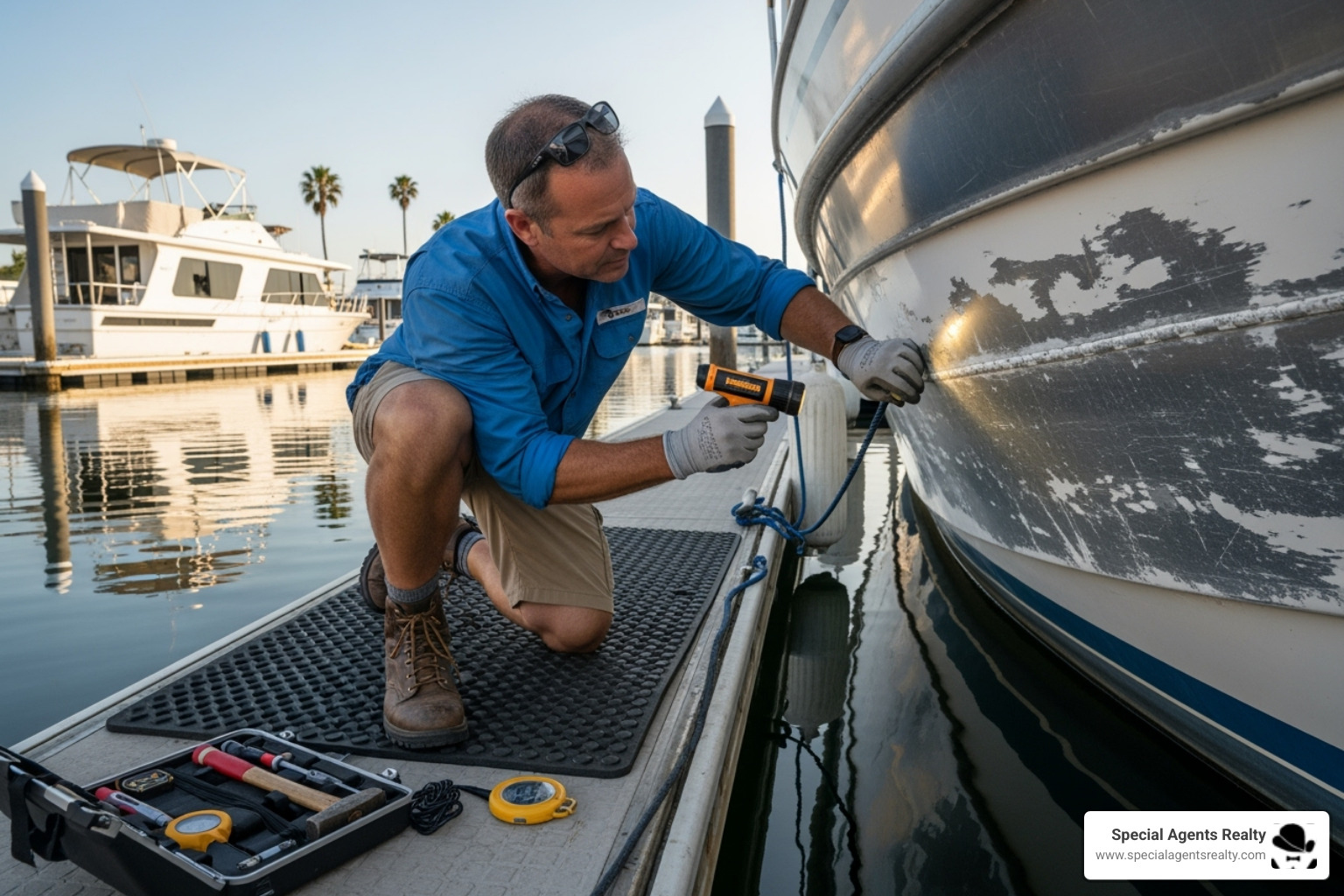
This is the most critical phase of your journey, where our buying a houseboat tips can save you from a costly mistake. Skipping due diligence is a common and deeply regretted error.
What are the Pros and Cons of Buying a New Versus a Used Houseboat?
- New Houseboat: Offers peace of mind with warranties, modern amenities, and customization options. The main drawbacks are a higher price tag and immediate depreciation once it hits the water.
- Used Houseboat: Provides better value, as the initial owner absorbed the steepest depreciation. However, it comes with the risk of hidden problems and out-of-pocket repair costs. A used boat can be a great deal if you're willing to invest in a thorough professional inspection.
Key buying a houseboat tips for inspecting a used vessel
Hiring a professional marine surveyor is not optional. They are your expert inspector for everything that keeps a structure afloat and functional. Their report is essential for making an informed decision and can save you from a disastrous purchase. Learn more about Hiring a professional marine surveyor.
When inspecting a used houseboat, focus on these key areas:
- Hull Integrity: This is what keeps you afloat. Check the material (fiberglass, aluminum, steel) for cracks, dents, or corrosion. A crack or repair longer than two inches is a red flag. Ask for the last haul-out date for an out-of-water inspection.
- Engine and Propulsion: Look for corrosion and worn belts or hoses. Rub engine oil between your fingers to feel for grit or moisture, which can signal internal wear. Always insist on a test run to check for unusual noises or smoke.
- Electrical and Plumbing: Look for damaged insulation, corroded connections, or excessive splices. Test all lights and appliances. Inspect plumbing for leaks and check the age and service history of the sewage holding tank.
- Roof and Window Leaks: Water intrusion is a major threat. Look for water stains, soft spots, or moisture around windows, doors, and on the roof.
- Maintenance Records: A seller with detailed service records demonstrates responsible ownership. These documents provide a clear history of the vessel's upkeep and any recurring issues.
More buying a houseboat tips: Questions to ask the seller and marina
Gather as much information as possible from both the seller and the marina.
Questions for the Seller:
- Why are you selling?
- Can I see the complete maintenance history and records?
- When was the last haul-out, and what work was done?
- What is the age of the engines, generator, and HVAC systems?
- Are there any liens on the vessel?
Questions for the Marina:
- Is the current slip transferable? If not, what is the waiting list like?
- What are the monthly mooring fees and what do they include (water, power, internet)?
- Does the marina allow full-time liveaboards, and are there extra fees?
- What are the rules regarding pets, rentals, and parking?
- What amenities are available (laundry, mail, pump-out services)?
Making it Official: Legalities, Regulations, and Professional Help

Once you've found the perfect houseboat and negotiated a price, you'll enter the legal and regulatory world, which blends maritime law with real estate principles. Understanding this maze is a key part of our buying a houseboat tips.
What are the legal and regulatory considerations when buying and owning a houseboat?
Houseboat regulations vary dramatically by city and even by marina.
- Local Regulations: Many cities, like Seattle, require specific liveaboard permits, which can have long waiting lists. You need permission to live on your boat full-time.
- Environmental & Safety Rules: Strict regulations govern the disposal of sewage, greywater, and fuel. Your vessel must also meet Coast Guard and local safety standards, including having fire extinguishers and life jackets.
- Moving a Houseboat: While mobile, moving a houseboat is complex. It requires notifying city departments, updating insurance, and, most challenging, finding an available slip at a new marina. For Seattle, check the city's specific regulations for floating residences/floating-residences-code#recordupdateinstructionsforfloatingresidences).
- Slip Ownership vs. Rental: Most owners rent their slips, signing a lease with the marina. In rare cases where slips are owned, they are considered real property, and you'll pay property taxes and possible HOA dues.
- Title and Registration: A houseboat has a title and registration like a vehicle. Ensure a clear title transfer to protect yourself from existing liens.
The Role of a Real Estate Agent and Marine Surveyor
Buying a houseboat is a hybrid purchase, requiring specialized help.
A specialized real estate agent is essential. They understand the nuances between houseboats and floating homes, unique financing, and complex local regulations. A major challenge is locating a slip, and a good agent has the connections to steer waiting lists and transfer rules. At Special Agents Realty, we have deep local knowledge of the Puget Sound and Seattle markets and can connect you with experienced professionals. Find an agent specializing in unique properties.
The marine surveyor is your other key ally. They provide a comprehensive inspection of the vessel's structure and systems. Their report is crucial for making an informed decision, negotiating repairs, and securing insurance. The investment in a surveyor almost always pays for itself by uncovering hidden issues.
Frequently Asked Questions About Houseboat Living
We know you'll have more questions as you consider this unique path. Here are some of the most common ones we encounter when discussing buying a houseboat tips.
Can you live on a houseboat year-round?
Yes, many people do. The key is preparing for the climate. In regions with freezing winters, like the Puget Sound area, this involves:
- Winterization: Protecting water and sewer lines with heated hoses or skirting.
- Insulation and Heating: Ensuring your houseboat has adequate insulation and a reliable heating system.
- Mobility: Some owners move their boats to warmer climates for the winter.
What are the typical amenities and living spaces found on modern houseboats?
Modern houseboats offer many of the comforts of a traditional home. Features often include:
- Full kitchens with modern appliances.
- Fully functional bathrooms with showers.
- Multiple bedrooms and spacious living areas.
- Upper decks or patios, sometimes with grills or hot tubs.
- Technology like solar panels, watermakers, and integrated entertainment systems.
- Recreational features like swim platforms and kayak racks.
Do houseboats depreciate in value, and how does it compare to a traditional home?
Yes, this is a critical financial distinction. Houseboats generally depreciate like vehicles or RVs, unlike traditional homes which typically appreciate. Your investment is primarily in the lifestyle, not in building equity for future financial gain. You can slow depreciation through:
- Meticulous Maintenance: A well-cared-for houseboat holds its value better.
- Timeless Design: Classic layouts are more desirable than passing trends.
- Strategic Upgrades: Updating systems or interiors can help maintain value.
Your Voyage to Houseboat Ownership
You've reached the end of our buying a houseboat tips guide, and hopefully, you're feeling both excited and informed about this unique path to homeownership. Living on the water isn't just about finding a place to sleep—it's about embracing an entirely different way of life, one filled with sunrises over the water, tight-knit communities, and the gentle rocking that becomes your nightly lullaby.
Remember the key takeaways: understand the difference between a mobile houseboat and a permanent floating home, plan for RV-style financing, and budget for ongoing costs like mooring fees and maintenance. Research local regulations, as rules in Seattle's Lake Union can differ from those in Bremerton or Kirkland. Most importantly, your houseboat will likely depreciate, making it an investment in lifestyle rather than financial equity.
Professional guidance is crucial. A specialized real estate agent can help you find a slip and steer the unique legalities, while a marine surveyor protects you from costly hidden problems.
At Special Agents Realty, we have deep local knowledge of houseboat communities throughout the Northwestern United States, from Seattle and Lake Union to the broader Puget Sound region. We understand these unique properties and can provide the expert guidance needed to ensure your journey to houseboat ownership is a success.
Ready to start your adventure? We'd love to help you find your perfect spot on the water. Explore houseboat and floating home opportunities with us. Let's chart your course together.
.avif)



